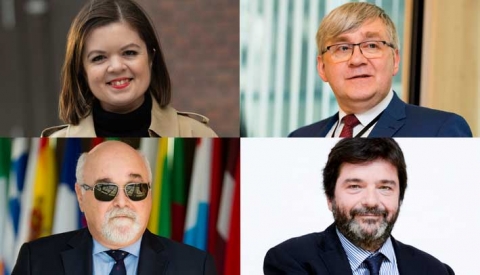We invite you to relive some of the key moments of a virtual press conference on the International Day of Persons with Disabilities 2020, organised by the Press Unit on 2 December 2020.
What lessons can be learned for people with disabilities from the pandemic crisis, which has lasted almost a year? This is just one of many questions. We encourage you to read our guests’ opinions.
Presentation in a nutshell
Sinéad Burke – Irish disability advocate and director of Tilting the Lens: “I am a disabled woman, I am an educator, a writer and an advocate for disability”
Ioannis Vardakastanis – EESC member and disability activist, president of the European Disability Forum: “I have dedicated my life to campaigning, advocating, fighting for the rights of persons with disabilities, from my village to the whole world”.
Krzysztof Pater – EESC member and author of the report on the right of persons with disabilities to vote in the EP elections: “For 20 years I have been trying to assist, to find solutions, to create a better legal environment for people with disabilities”.
Pietro Vittorio Barbieri – President of the EESC’s Thematic Group on Disability Rights: “This is not an ordinary day; we are now going through a period that is taking us from inclusion to exclusion. The main issue is people’s isolation during the pandemic”.
Worth knowing…
How optimistic are you concerning your efforts to encourage children to accept differences and celebrate their own self? How are they reacting?
Sinéad Burke: “I have tangible hope that the future will be better. We often say that children don’t see difference, I don’t think that’s true. Children do see difference; they are aware of identity. How children differ from adults is that they respond with curiosity. I would ask adults to take note of how children respond. Acceptance and curiosity are so important. I think adults need to be inspired and take direction from children on how they respond to disability”.
What can we do so that people with disabilities in Northern Ireland are not separated from the Republic of Ireland in terms of human rights and working conditions, especially for remote workers with disabilities?
Ioannis Vardakastanis: “Collaboration with organisations for people with disabilities will go on and issues concerning people with disabilities will be high on the agenda. The message is clear. Unity and the rights of people with disabilities have to be respected by all governments. They cannot be isolated through Brexit or other political decisions”.
Pietro Vittorio Barbieri: “The Brexit agreement by the end of 2020 will define the political agenda”
Sinéad Burke: “As we move forward to Brexit, we should not continue to focus on profit and trade but should shift the focus to people. Creating people-centred policies, particularly in the pandemic, is important. I hope we will continue to be allies and support those who are marginalised, who are often people with disabilities”.
Krzysztof Pater: “The European Disability Forum is a fantastic platform. At the time of the report and before the European Parliament elections, nobody expected the UK to leave the EU, but the UK has a number of legislative solutions that should be taken into consideration by many EU organisations”
What, in your opinion, has been the biggest impact of the pandemic on people with disabilities and which aspects of daily life have been affected most?
Krzysztof Pater: I would like to underline the lack of contact with others, which not only affects people’s mental health but also their everyday life (in terms of assistance, shopping, rehabilitation). Action plans imposed by governments during the pandemic have forgotten about people who live in long-term care institutions”.
Pietro Vittorio Barbieri: “The area most affected is people living in care homes and the feeling of isolation. Old people have been abandoned”.
Sinéad Burke: “During the pandemic they were measuring your ability to survive the treatment. If you were older or disabled you were less likely to receive treatment. Some lives are more valid than others? I think now that we are designing places for social distancing we have the opportunity to create new foundations and think about how we would like the world to look, with disabled people at the heart of this development”.
Ioannis Vardakastanis: “Paraphrasing the US slogan, lives of people with disabilities matter, too. During the pandemic, we have seen exclusion, health poverty, discrimination and inequalities in the health system. “Nothing about us without us” has to be a real driving force for changing policies and systems to make lives of people with disabilities matter.” (at)
eesc.europa.eu

















